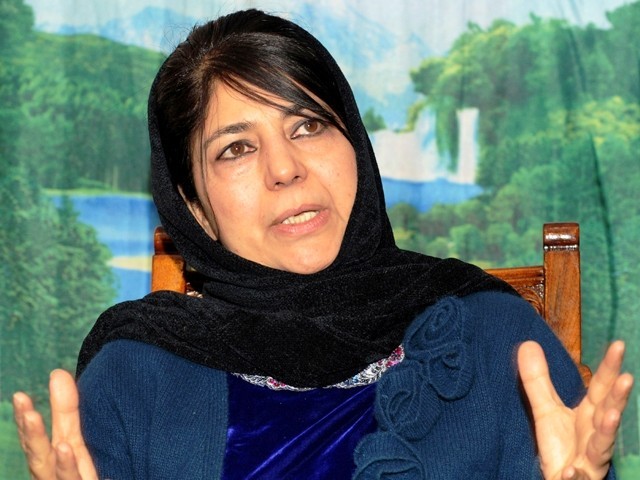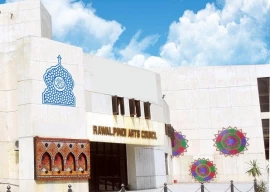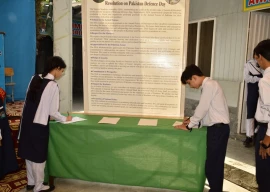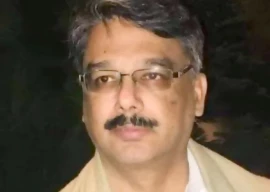
The Chief Minister made several pro-people statements, completely opposite to what the Indian government, led by Bharatiya Janata Party (BJP), makes. The party is a coalition partner with Mehbooba’s Peoples Democratic Party (PDP) in the state government.
UN chief condemns Indian Kashmir killings, calls for dialogue
Mehbooba has grievances, but with whom?
In her speech, Mehbooba claimed she too had grievances at the way Kashmir issue has been handled, without specifying who was ‘handling’ the situation. The recent scenario somehow suggests the state government does not have enough control over the present unrest. The first meeting chaired by the Indian Prime Minister Narendra Modi to review the situation lacked the presence of any government representative or administrative officer from Kashmir. Former chief minister Omar Abdullah was the first to question Mehbooba’s absence in the meeting. Similarly, when government forces imposed a strict curfew in Srinagar, the summer capital of Jammu and Kashmir, on August 13, the forces did not allow journalists to move around, even though they had government-issued passes. According to local newspapers, journalists were asked to get the Indian government issued curfew passes and permits given by the state administration weren’t valid. On August 18, a representative of fuel dealers told a Srinagar-based news agency that the government had asked the oil depots to stop distributing fuel to the dealers. The Divisional Commissioner, Kashmir, refuted the allegations later in the day and said the dealers had complained of attacks by civilians. Similarly, forces did not allow vegetable and milk suppliers to reach Srinagar on the pretext of curfew.
Rights violations: UN seeks observer access to Kashmir
Democracy: From elections to pellets
“People of Jammu and Kashmir chose democracy, not considering the religion. But why [does] democracy remain limited to participation in elections only,” said Mehbooba. She has well-understood that democracy remains limited to elections in Kashmir. However, people do not believe in it later because they feel they are not represented by the government they choose. For instance, Mehbooba, who is the president of PDP, asked for votes in the State Assembly elections in late 2014 on the pretext that the BJP would otherwise form a government in the region. The two parties are of opposite ideology; Mehbooba’s PDP advocates self-rule in the state while the BJP advocates abrogation of the state’s special status in the Indian Constitution. Mehbooba and other senior leaders of PDP warned people of BJP’s anti-Kashmir agenda, asking them not to pay heed to the election boycott-call by the separatist leaders and vote to protect Kashmir from coming into BJP’s hands.
But Mehbooba forged an alliance with the same BJP after her party emerged as the single largest party in the fractured mandate. It was the first time when BJP came into power in the state. Since then, the coalition government faces strong protests against issues such as beef ban and establishment of separate townships for migrant Kashmiri Pandits and retired army men.
Modi ‘crossed the red line’ when he mentioned Balochistan: Foreign Office
Dialogue is the only way but lacks action
The Chief Minister once again pitched the idea for a dialogue between the Indian government and “all other stakeholders” for resolving Kashmir’s political issue. However, the Indian government, led by the party she is in alliance with, does not even recognise Kashmir as a political problem or a dispute, referring to it as a “law and order” issue. The central government does not even recognise the protests as a genuine call of concern from civilians. Instead, Prime Minister Modi and Home Minister Rajnath Singh have been blaming Pakistan for “sponsoring” the insurgency in Kashmir as a “proxy war”. In fact, even though Kashmir unrest is getting worse with each passing day, Modi did not even mention it in his Independence Day address at the Red Fort in the Indian capital New Delhi. Instead, he chose to speak about the people of Pakistan’s Baluchistan, which is a clear internal matter of Pakistan. Similarly, in an all-party meet held days ago over the uprising in Kashmir, the government did not decide to send an all-party delegation to the state, which was demanded by opposition led by the Congress party.
On the other hand, Mehbooba did not specify who the “stakeholders” in Kashmir are and there has not been any attempt by the government to initiate a dialogue process with the separatist leaders, on whose call thousands of people rise in protest. Similarly, although Mehbooba continues to advocate for dialogue, the central government rejected Pakistan’s invitation for foreign secretary-level talks on Kashmir issue. The government said it was ready to hold dialogue over “cross-border terrorism”, saying it was central to the current situation in Jammu and Kashmir.
Pakistan, India to decide fate of Kashmir talks: US
Passing the blame on previous governments
“Because of the mistakes of our leadership and the mistakes of the leaders at the country level in the past, we are witnessing the present situation in Kashmir,” said Mehbooba. The situation has, however, improved or worsened based on how the governments at the state and the central level deal with issues surrounding Kashmir. For instance, former Prime Minister Atal Bihari Vajpayee is widely respected by Kashmiri separatist leaders and common people for his initiatives towards building good Indo-Pak relations while taking separatist leaders on board. Although Mehbooba largely referred to the allegedly rigged elections of 1987 for the onset of armed insurgency, the present situation could certainly have been better if present governments also took Vajpayee’s pro-people and pro-resolution initiatives over Kashmir issue.
Rebuff to Modi: Nawaz reiterates ‘fullest support’ to Kashmiris
“Hope” without any signs
Mehbooba said Prime Minister Modi also spoke of Kashmir issue and talked about Vajpayee’s slogan of “insaniyat, jhamooriyat and Kashmiriyat”. However, Modi did not recognise the present mass uprising as a valid call, but instead talked about “sponsored” terrorism and violence in Kashmir. Vajpayee’s policy was to hold talks with the separatist leaders and make friendly-relations with Pakistan. But Modi has been completely ignoring the separatists as a stakeholder and refusing to talk to Pakistan about Kashmir issue, except if it’s only about terrorism and Azad Kashmir.
Mehbooba further said the discussion in the Indian Parliament on Kashmir issue was a “hope” that the issue would not be abandoned. But there was no effective discussion held. The opposition only raised concern over the unrest, killings, pellet injuries and disconnect between the Indian government and people of Kashmir. It also demanded to send an all-party delegation to the province but the demand was not met. The opposition raised hue and cry over Modi’s absence in the debate, but Modi chose to remain silent. He only spoke about the unrest in a rally in Telangana state a few days before the debate in the Parliament, where there was no one from the opposition to question him.
Google Maps shows Azad Kashmir as Indian territory in latest gaffe
Ambiguity over “vested elements”
Mehbooba has continuously blamed unnamed “vested interests” or “vested elements” for provoking the youth towards protests and violence. She repeated the same in her Independence Day speech. “My heart is filled with pain for these youth who lost their lives to nefarious designs of vested elements,” she said, adding that they (vested elements) want to keep Kashmir burning. Factually, the present unrest erupted soon after the government forces shot dead Burhan in an encounter. The forces opened fire on protesters, including stone pelters, in many parts of South Kashmir, killing at least 12 young men on July 9, when over 100,000 civilians were assembled at Burhan’s funeral in his hometown, Tral. This angered the civilians, giving rise to a cycle of killings and protests that continues till date.
So, who are the “vested elements”? The Indian Government blames Pakistan in clear words, but Mehbooba does not specify. If Mehbooba is referring to the Hurriyat leaders, then the grounds on which she advocates a dialogue with them remains unascertained. Not naming these “vested elements” is yet another vague statement by the Chief Minister.
Islamabad rejects New Delhi’s claim on Kashmir
Children of conflict
Mehbooba also spoke about the presence of children in street protests. “What kind of protests are these where children are put at the forefront as cannon fodders,” she asked. “Today, unfortunately people who want to disturb peace are making these children fodder for their vested interests and using these children as shields,” she added. But the Chief Minister fails to answer what kind of democracy is this where peaceful protests are not allowed, what kind of governance is this where it is not certain who is in control, what kind of police is this that fires lethal pellets towards protesters seeking justice and what kind of justice is this where the government pleas in the country’s apex court to not arrest a senior police officer charged for murder, because it would demoralise the police force?
The present young generation in conflict-hit Kashmir has never seen peace. Armed insurgency started in late 1980s and the generation grew in the middle of gunfights, staged encounters, mysterious disappearances, gruesome rapes and other human rights violations by the hands of the Indian armed forces. They grew among slogans for “azadi” when many of them did not even know what it meant. How can then one expect young adults and children not to be angry?
Kashmir cause cannot be suppressed through violence, Nisar tells India
Right to protest and the curb on protest
Mehbooba said people have the right to protest but when the protests turn “violent and when petrol bombs and grenades are used by the protesters, it becomes a problem.” The main reason why violent protests erupt in Kashmir is because the government does not allow peaceful protests. Strict curfew is imposed whenever the separatists call for a peaceful protest march. Not even the elected legislators are allowed to protest peacefully. For instance, independent legislator, Er Abdul Rasheed, staged a peaceful sit-in protest near the press enclave in Srinagar to protest against pellet guns. But the police used force and detained the protesters, including the legislator, even though no one pelted a stone, hurled a petrol bomb or lobbed a grenade at anyone. The restriction on peaceful protests aggravates people, who then forcefully break curfews and sometimes pelt stones on police in anger.
Criticism: Govt has failed to resolve Kashmir dispute, says Haq
Unaccounted accountability
“The responsibility of my government is to protect people who don’t want to be a part of the protests and at the same time ensure maximum restraint by the forces,” said the Chief Minister. But what does it mean to protect people who “don’t want” to be part of the protests? “Amidst all this some bullets and pellets are fired in which our youth get killed and injured, but at the same time police and other security forces have got injured in equal numbers which shows how much restraint have they exercised,” said Mehbooba. This is not less than a verdict, acquitting the government forces of any blame.
She also said her government will probe any extremes “if committed” by the forces to hold them accountable. This is in clear contradiction to the murder case filed against a Deputy Superintendent of Police for shooting a youth dead in Srinagar during the on-going unrest. A court ordered filing an FIR against the accused officer, but the government ultimately appealed in the Supreme Court of India against his arrest, saying it would demoralise the forces. “Wherever any wrong has been committed and wherever I feel that excessive force has been used by police and other forces against my direction, we will hold them accountable. I am not saying it for the sake of it. We will make everything public,” she added. But the murder case is already public and has created more anger, leading to more protests.
India's home minister arrives in Islamabad to attend SAARC meeting
‘Guns no solution’ – An unheard plea
The statement that made headlines in Indian media was, “Guns whether of militants or ours will not solve any issue.” Mehbooba said this at the Bakshi Stadium, which is only a ten-minute drive from Nowhatta where, on that day, militants opened fire on paramilitary forces, and the exchange of fire killed two militants and a paramilitary commander. Eight other personnel were injured. Mehbooba’s statement could serve a purpose in reaching out to militants. However, on the side of the Indian forces, only seven hours after she made this statement, a 16-year-old boy was shot dead by police in Batamaloo area of Srinagar, which is a five-minute drive from the stadium. It was initially reported to be a firing incident against protesters, but local newspapers quoted eyewitnesses who said there was no protest going on in the area and the boy was shot dead in a target shooting. The next day forces opened fire on protesters in Budgam district, killing four protesters and injuring at least 15. Another protester was shot dead in Anantnag district in South Kashmir. ‘Guns are no solution’, but are batons? Kashmir rose on August 18 with the news of a 30-year-old lecturer beaten to death by the Army’s Rashtriya Rifles – the counter insurgency force – in Pampore area of South Kashmir. The Army personnel went on a rampage in the area at night, thrashed men and women, young and elderly, and dragged them to a nearby Army camp. Several civilians suffered gruesome injuries.
Pakistan, India spar over cross-LoC terror
Unfreedom of speech
“India is the largest democracy in the world where you can speak freely. If we can’t get solution to our problems here then no gun in the world can give justice to us,” said Mehbooba. While the separatist leaders remain caged in their houses, the common people have no way to communicate as the government snapped all private mobile telecom networks and internet services. Police raided newspaper bureaus last month, seized their printed copies and detained their employees at night. No newspaper hit stands for next five days. Only after the issue got international attention, government assured freedom of the press and newspapers resumed publishing. The security forces, however, disallowed journalists’ access to curfew bound areas on August 13.
India to attend SAARC meeting in Islamabad amid Kashmir tension
Plea: Help restore peace and save lives
Mehbooba appealed the youth to help her government “restore peace and save lives.” Sixty-five people have died in the on-going civil uprising in Kashmir since July 8, when Indian armed forces shot dead popular armed separatist commander Burhan Wani.
It was not the first time Mehbooba plead for peace, she has made the same plea multiple times earlier as well. Instead of appealing to armed forces to stop shooting dead young protesters, some of whom engage in stone-pelting clashes, the Chief Minister chose to appeal to the youth, who are already aggrieved with her government’s response to the unrest.
Vijdan Mohammad Kawoosa is a Kashmir-based journalist and founder/editor of news website jandknow.com



1732623521-0/bitcoin-(1)1732623521-0-165x106.webp)













COMMENTS (2)
Comments are moderated and generally will be posted if they are on-topic and not abusive.
For more information, please see our Comments FAQ